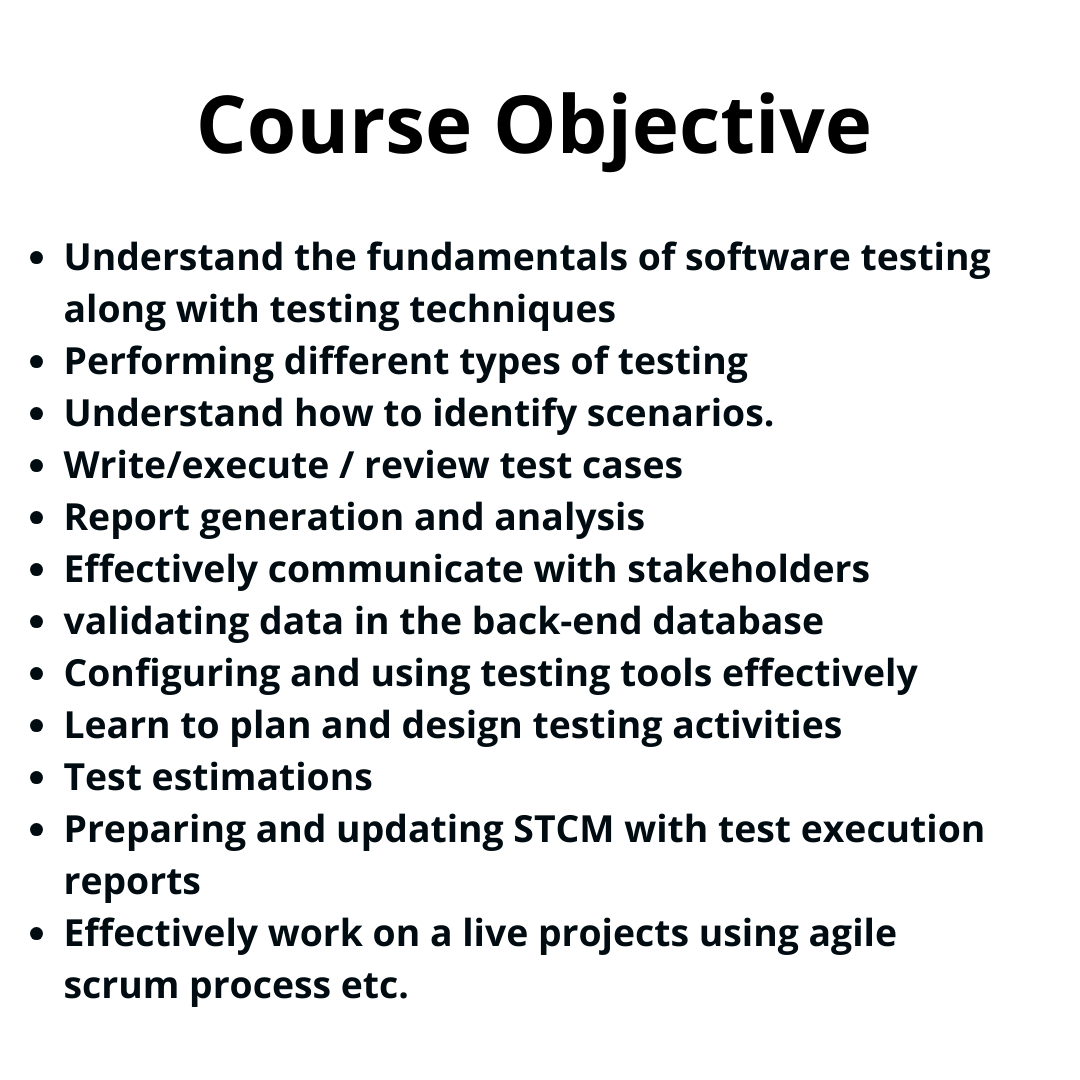Software Testing
Software Testing plays a vital role in the software development lifecycle by ensuring that software products are reliable, functional, and meet user expectations. This course guides you through the systematic process of testing software to identify defects, verify requirements, and deliver high-quality applications.
What You Will Learn: Key Components of Software Testing
1. Manual Testing: Understand how human testers execute test cases manually to explore, evaluate usability, and perform ad-hoc tests that require human judgment.
2. Automated Testing: Learn to use automation tools to run repetitive tests efficiently, perform regression testing, and manage large-scale test suites for faster and more accurate results.
3. Functional Testing: Validate software features against specified requirements to ensure every function works exactly as intended.
4. Non-Functional Testing: Evaluate essential qualities such as performance, usability, reliability, and security to guarantee the software can handle real-world conditions smoothly.
5. Unit Testing: Focus on testing individual components or modules, usually done by developers, to verify that each part performs correctly in isolation.
6. Integration Testing: Test the interaction between combined modules to ensure they work together seamlessly.
7. System Testing: Conduct comprehensive testing on the fully integrated system to confirm overall functionality and adherence to specifications.
8. Acceptance Testing: Involve end-users or clients to verify the software meets business requirements and is ready for deployment.
This course combines theory with hands-on practice, preparing you to confidently perform various types of software testing. Whether you’re starting a career in IT or aiming to enhance your current role, mastering software testing will make you an invaluable part of any software development team.
Key Highlights of our Course
What you'll learn in this course

Heuristic Academy provide you
- 2 Months Intense Training
- Offline E-Learning with Industrial Professionals
- Hands-On Experience on 16 Live Projects
- Interview Preparations with Mock Interviews
- Campus Activities (Project Competitions & Tech Events)
- Internship Certificate after Completion of Course
- 100% Job Placement Assistance
Choose the right Development course for you.
FAQ
The average salary of a software tester in India varies based on experience, location, and expertise. Here's a general breakdown:
- Entry-Level (0–2 years): ₹2.5LPA to ₹5LPA
- Mid-Level (2–5 years): ₹5LPA to ₹10LPA
- Sr-Level (5+ years): ₹10LPA to ₹15LPA or higher
The field of software testing is ideal for individuals who have a sharp eye for detail, excellent analytical abilities, and a strong commitment to quality assurance. It’s perfect for those who enjoy uncovering issues, ensuring software reliability, and collaborating effectively within teams.
While a specific degree isn't always required, most employers prefer candidates with a solid educational background in computer science, software engineering, information technology, or a related field. However, many successful software testers are self-taught or have completed specialized training.
Typical paths to enter the field:
1. Bachelor's Degree:
- Pursuing a bachelor's degree in computer science, software engineering, or a related field provides a strong foundation in programming, algorithms, and software development principles.
2. Self-Study and Practice:
- Some testers are self-taught, learning through practice, building projects, and contributing to open-source communities. This path requires self-motivation and dedication.
The field of software testing offers a broad spectrum of exciting career opportunities across many industries and sectors. Here are some common roles you might pursue:
Quality Assurance (QA) Engineer:
Designs and executes detailed test plans, identifies defects early, and ensures software quality throughout the entire development lifecycle.
Automation Tester:
Specializes in using automated testing tools and frameworks, writing scripts to automate repetitive test cases for greater efficiency and accuracy.
Performance Tester:
Focuses on evaluating how applications perform under various conditions, pinpointing bottlenecks, and recommending enhancements to improve speed and stability.
Security Tester:
Experts in detecting and addressing security vulnerabilities within software, ensuring data protection, and maintaining compliance with industry standards.
Test Manager:
Leads and coordinates testing teams, manages test strategies and execution, and ensures the overall quality of software deliverables.
Freelance Tester:
Offers flexible, project-based testing services, allowing the freedom to work on diverse projects and build a varied portfolio.
Overall, software testing jobs are plentiful and varied, spanning industries such as finance, healthcare, e-commerce, education, and many more. As the demand for reliable, high-quality software grows, software testers can look forward to a rewarding career with ample opportunities for growth and advancement.
- Hands-On Learning
- Internship Opportunities
- Course Completion Certificate
- Mentorship by Experts
- Lifetime Alumni Community Access
- Placement Assistance
- Updated Curriculum
- Flexible Learning Options
- Continuous Support
Software Testing Certification & Internship
Become a Certified Software Testing, perfect your skills and accelerate your career with Heuristic Academy to get your dream job.
At Heuristic Academy, we go beyond traditional training. Our ISO-certified Software Testing course is designed to build strong skills and real-world expertise. As part of the program, you’ll work on live projects that reflect industry practices. Upon completion, you’ll receive both a Course Completion Certificate and an Internship Certificate, validating your hands-on experience. These credentials are highly valuable for boosting your resume, LinkedIn, and career profile, helping you stand out in today’s competitive job market.


Choose the right Development course for you.
Share the opportunity to learn and grow & get rewarded for it!
📢 Refer a Friend
📝 Fill out the form and share your unique referral link with friends, family, or anyone interested in upskilling.
🎁 They Get a Gift Voucher
🛍️ Your friend will receive an Amazon or Flipkart gift voucher when they enroll through your referral link.
🏆 You Get Rewarded
💸 If your friend enrolls in any of our courses, you’ll receive a special gift and a cash reward of up to ₹1000 — delivered 30 days after their course begins!